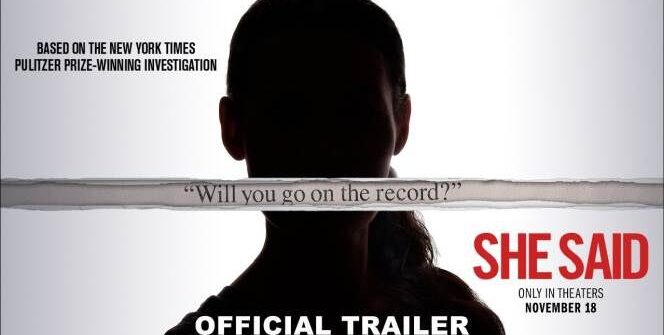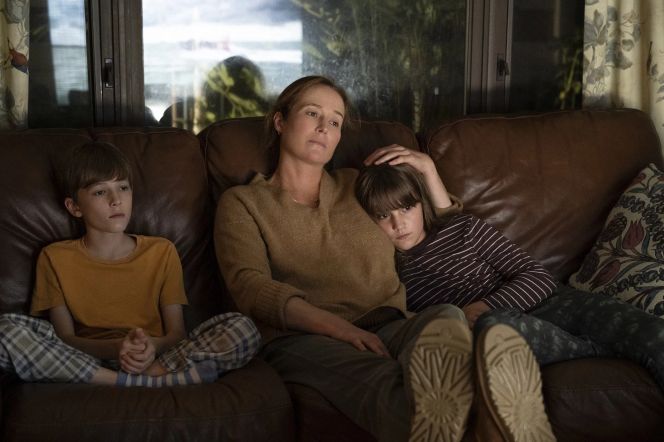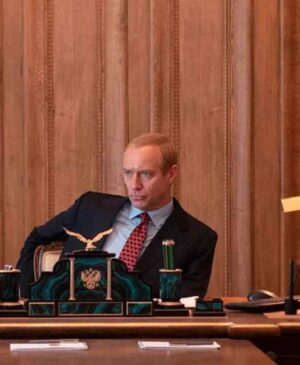MOVIE PREVIEW – On October 5, 2017, New York Times investigative reporters Jodi Kantor and Megan Twohy came up with a shocking story that shook the entertainment industry and resonated across America: “For decades, Harvey Weinsten has been hushing up accusers of sexual harassment with money.”
Hollywood hotshot Harvey Weinstein has long reigned as one of the most powerful figures in the film industry. As a producer, he won the Academy Award® for Best Picture six times for films such as Sex, Lies, Video, Pulp Fiction and Good Will Hunting, so powerful was his influence that he could easily launch or destroy careers. As Kantor and Twohey disclosed, he allegedly used this influence to harass women and coerce them into sexual relations.
The journalists have uncovered 3321 carefully chosen words, dating back three decades, of previously silenced crimes. They have meticulously documented their account: interviews with former and current Weinstein employees; and a study of the transcripts, emails and documents that have emerged from the two companies of the powerful producer, Miramax and the Weinstein Company, the dominant brands in Hollywood. What they uncovered was unquestionable. Thanks to their dogged persistence and the help of many brave former victims and other sources, the truth has finally been uncovered.
It has been whispered about for years
Weinstein’s misdeeds have been whispered about for years, but journalists who tried to sniff out the truth have been met with resistance from sources and forced to confront the producer’s harsh and intimidating methods. Victims often did not dare to speak out, or were prevented from doing so because they had reached a silent agreement or had to abide by their confidentiality contracts. When they did go public, they rarely got results. Throughout American and world history, women who have complained of sexual abuse by powerful men have often been branded as half-wits, money-hungry, liars or ignored. The men had no hair on their heads. Women were pushed aside or humiliated. So, no matter how hard reputable journalists tried during the Hollywood reign of Weinstein and his ilk, the sanctity of silence could not be broken. No one was able to get to the bottom of the story.
Twohey and Kantor’s exceptional expertise and experience – and their passionate determination to expose the crimes – predestined them to team up and plunge into a months-long investigation to uncover the truth behind the sexual allegations against Weinstein.
Twohey and Kantor have devoted their careers to holding the powerful accountable and protecting women and children.In 2016, Twohey wrote about the women who accused Donald J. Trump of groping and sexually abusing them. She uncovered a dangerous underground network of parents who removed their unwanted adopted children. Exposed abusive doctors and the systems that let them continue to practice. He was among the first journalists to draw attention to how police and prosecutors bury DNA evidence collected after sex crimes, depriving victims of justice. His reports have put predators in jail and ushered in a new era of victim protection.
Jodi Kantor’s reports on working mothers and breastfeeding prompted two readers to set up separate feeding stations, which operate in airports and are already spreading across America. She wrote an article about the chaos caused by automated scheduling for Starbucks workers, and a national movement for fair scheduling. His reports on Amazon have had a similar impact: in 2015, he and David Streitfeld exposed the giant’s punitive policies and introduced paternity leave. In 2021, Kantor, Karen Weise and Grace Ashford investigated conditions at a warehouse complex in Staten Island and revealed serious problems with the company’s employer system, including a 150 per cent annual turnover rate, a long history of payroll problems and unjust dismissals that include maternity leave. Employees have used the information to form a union.
Kantor and Twohey’s investigative piece on Weinstein, edited by Rebecca Corbett, set off a wave of reports, including Ronan Farrow’s article on the allegations against Weinstein, which appeared in The New Yorker the same month. In the weeks and months that followed, more and more women came forward to report on their traumatic encounters with Weinstein and other powerful men. The #MeToo movement, started by activist Tarana Burke in 2006, was linked to these stories and quickly became a national and global battle cry, amplifying the voices of tens of thousands of victims harassed or raped. It was as if a dam had suddenly burst. For decades, many well-founded accusations fell on deaf ears, but now more and more people are beginning to listen to women and give them credit.
Kantor and Twohey’s report won a Pulitzer Prize and was the basis for the best-selling book She Said, published in 2019.
A film for this generation and the next
Just a few months after Kantor and Twohey’s report was published, Plan B Entertainment producers Dede Gardner and Jeremy Kleiner, along with Megan Ellison and Sue Naegle, bought the rights to film the story from Annapurna Pictures. “Jodi and Meghan’s investigation was such a watershed moment, not just for the film industry but for the culture as a whole, that it cried out for a movie,” says Dede Gardner.
Moreover, the story had an underlying content, not just the mere facts of the investigation. “Many of the women in the story, including Jodi and Megan, are mothers,” says Gardner. “Jodi and Megan’s primary job was to tell the truth accurately and credibly, but beneath that moral, journalistic layer, we also find a deeper, emotional moment. For them, and for the victims and witnesses, it was hope in the search for the truth that gave them strength. While we are still incredibly far from insulating ourselves against this kind of behaviour, we felt it was essential to incorporate Jodi and Megan’s journalistic attitude into the tradition we want to pass on to our children.”
The journalists trusted the filmmakers, but it was a leap in the dark on their part. Twohey and Kantor were reassured by the fact that Plan B had already proven itself: it made excellent films about real people based on real facts. Examples include 12 Years a Slave, Selma and The Big Short. Nevertheless, assurances were sought that the story of the investigation would be told without distortion and with due respect. “When we met with Dede and Jeremy, we were impressed from the first moment,” says Twohey, “not only because they make quality films with a serious message, but because we saw that they wanted to tell this story as accurately and as honestly as possible. As journalists, these things are extremely important to us.”
Gardner and Kleiner, after talking to journalists, came up with a bold and in a sense contradictory idea to the logic of the whole story – to end the film with a sudden dramatic climax, rather than tying up all the loose ends in a reassuring way. “Everybody knows what happened after Jodi and Megan’s first story came out,” says Gardner, “but what everybody doesn’t know, and that’s what this film is about, is the sacrifices that it took for all the people involved to get that first story published. The ending was a gamble on our part, but we stayed true to that vision from the beginning.”
Once the rights were bought, the producers started looking for a scriptwriter. “We wanted to tell this story honestly and truthfully,” says Jeremy Kleiner, “Dede and I wanted to keep the focus of the story on the investigation and the victims and the witnesses, and we were looking for a screenwriter who could do the human challenge of taking a brutally emotional stance but marrying it with a gritty and objective forensic rigour.”
That’s how they found Rebecca Lenkiewicz, the acclaimed British playwright and screenwriter, whose works such as Ida and Disobedience proved compelling. “Rebecca is able to approach very serious subjects in a very personal, almost visceral way,” explains Kleiner. We believed Rebecca could do that, and she also comes up with unexpected structural solutions, which is her trademark.”
“It was an earth-shattering story,” says Lenkiewicz, “I felt how important the investigation was, both on a deeply personal and global level. I admired the courage and resilience of the victims, as well as the strength and determination of the journalists. I found this story uplifting and inspiring, despite all its horror.”
Kantor and Twohey were working on the book when they met Lenkiewicz, who started writing the script. “I saw him at work based on our conversations, and shortly after that, they started sending me chapters and excerpts of the book,” Lenkiewicz says. I copied some of the dialogue verbatim. The heroism and perseverance of the victims was key, as was the respect and determination of the journalists for them. This story was suppressed for decades.
As well as details of the book, I also showed a few glimpses of journalists’ lives, how they behave at home, at work and ‘in public’.”
Over the next three years, Gardner and Kleiner worked with Lenkiewicz, Kantor and Twohey on the script: setting the story’s framework, clarifying the narrative’s intentions and determining the direction of the main attack. It was agreed that Harvey Weinstein would not appear in the film. Not a single violent scene will be shown, and all such incidents will either be narrated by the victims themselves or will be mentioned verbally. “We did several versions of the script, always striving for accuracy and depth,” explains Gardner. The producers kept in touch with victims and witnesses. “It was extremely important to us that the real characters in the story were involved in the creative process. This made the story more accurate, authentic and enriching on every level.”
The film shows not only Kantor and Twohey’s challenging work, but also their personal lives, such as Twohey’s post-partum depression after the birth of her daughter. For the two much-tried journalists, it was initially a little disconcerting to find themselves the subjects of a story suddenly. “We had an unusual relationship with the production,” explains Kantor. It’s not easy when you’re dealing with such a sensitive subject. We were also represented on screen, the film was made from our book, so we are doubly involved in the project, but at the same time we didn’t make this film. This is not an article from The New York Times. We’re used to putting all the commas and semicolons in the articles that we write. It was very new for us to have another writer take over our role.”
After Lenkiewicz had finished the first draft, they met with Gardner and Kleiner, Kantor and Twohey in the conference room of the New York Times to go through the script in detail. The meeting took place on the eve of the pandemic, in February 2020, shortly before a New York jury found Harvey Weinstein guilty. As it turned out, She Said is the first feature film of this scale to be shot in the New York Times newsroom. “One of the rare positives of the covid was that the building was almost empty,” says Gardner, “so we were able to shoot on the original location.”
Reporters have sought to give an honest account of the Times, and the important role played by editors such as Rebecca Corbett, who managed the Weinstein project, and Dean Baquet, who provided invaluable support to journalists. “It’s not often in mass culture that we get an accurate portrayal of how life is at The New York Times,” Kantor explains, “and that’s especially important now, when journalists are harassed, criticized, attacked and labelled as ‘fake news’. The New York Times is not perfect. The journalists here are not perfect. But we believe in the honesty and professionalism of this institution, we see the search for truth as a sacred mission, and we wanted a film to show our workplace as we see it, and to show our colleagues as we see them.”
By the beginning of 2021, Lenkiewicz’s script was largely complete and the filmmakers began looking for a director. One candidate stood out from the crowd: Maria Schrader. “I was impressed by the complexity and intelligence of the script, the boldness with which it insisted on detailing investigative journalism, and the incredible number of characters in the story,” says the actor-director, “Rebecca’s script revealed that it was not primarily about Weinsten, but about the journalists and the women who bravely told their stories. It was about something much bigger than Hollywood.”
Text to film – Capturing the truth on camera
Maria Schrader faced particular challenges when making SShe Said. Firstly, she had to portray the experiences of the two journalists and the complexity of their investigation in a realistic way. “This is a story about how important investigative journalism can be,” explains Schrader, “We wanted to get a sense of what it all means – how much determination and will it takes, what the investigation itself looks like – and the impact it can have. I wanted to introduce the audience to the experience that journalists have in uncovering this complicated case, with all the twists and turns of the story, the successes and failures, not forgetting to highlight the personal sacrifice.”
All this means finding a way to dramatise in a credible and entertaining way the incredibly laborious process of gathering and processing information, which consists of endless phone calls, emails, document acquisition and evaluation, and a series of heated meetings with editors. To accomplish this, the director and producers have drawn on traditions that have been developed by some of the finest investigative thrillers, most notably 1976’s Oscar®-nominated All the President’s Men and 2015’s two-time Oscar® winner Spotlight – Part of an Investigation. (In the former, reporters from The Washington Post investigate the details of the Watergate affair that led to President Nixon’s resignation, while the latter is about how Boston Globe reporters uncovered the cover-up of child molestation in the local Catholic diocese. )
“Of course, our film has all the obligatory genre elements – huge stakes at stake, paranoia, walls to break through,” explains Schrader, “It’s a very dramatic story, with strong characters facing enormous odds and a powerful adversary, travelling across the globe and jumping back and forth in time. This material has proved to be extremely rich, so it was our job to bring out the specific details and not to overstate or over-dramatise what was already there.”
The filmmakers wanted to portray the story in its raw reality, but She Said is not a documentary. The filmmakers wanted to capture a deeper emotional truth, illuminating, as Schrader puts it, “the empty spaces between words, emotions, personal risks, doubt, direct experience, the unspoken, images, faces, body language, behaviour.”
The film does not depict violence; all such acts are reported by the victims themselves. “It was not my intention to add another rape scene to the palette,” explains the director. Harvey Weinstein himself appears only very rarely. He only appears in one voice-over, and in the few scenes where he does, only his back is visible. The audience never sees the face of the actor playing him. “Our source was the book and the lives of the reporters,” says Schrader, “Their experiences and the accounts of those they interviewed were the guiding thread. Weinstein rarely appears, but his presence is felt everywhere, and his actions drive much of the plot. I imagined it as Jodi and Megan wrote their report. They didn’t have much contact with Weinstein either.”
The production’s senior staff are mostly women. “Our goal was to put together a team of the best people,” explains Schrader. “The story is about women standing up for themselves, claiming their place under the sun, so it felt right to make this film with women in the lead. However, I look forward to the day when a team led by women is no longer a curiosity.”
The impact of the report and what came after – A story that shook the world
On October 8, 2017, just three days after the New York Times report, the Weinstein Co. announced that Harvey Weinstein had been fired.On May 31, 2018, a New York grand jury indicted Weinstein on rape and sexual assault charges.On February 20, 2020, he was found guilty of sexual assault and rape; on March 11, the then 67-year-old was sentenced to 23 years in prison.
On 10 October 2022, the second trial in Los Angeles began, in which Weinstein is accused of 11 counts of rape against five victims. Weinstein has denied any wrongdoing in both the New York and Los Angeles cases, claiming that the sex was consensual.
In the wake of Twohey and Kantor’s work, as well as subsequent articles and the global spread of the #MeToo movement, Hollywood culture has changed in many ways. More victims have come forward, powerful men accused of sexual crimes have lost their positions and/or been prosecuted, and the industry has taken serious action. It has become common practice, for example, for film and TV productions to employ intimacy coordinators who are present on set to protect actors when scenes of a sexual nature are filmed.
-theGeek-
Source: UIP Dunafilm



















Leave a Reply